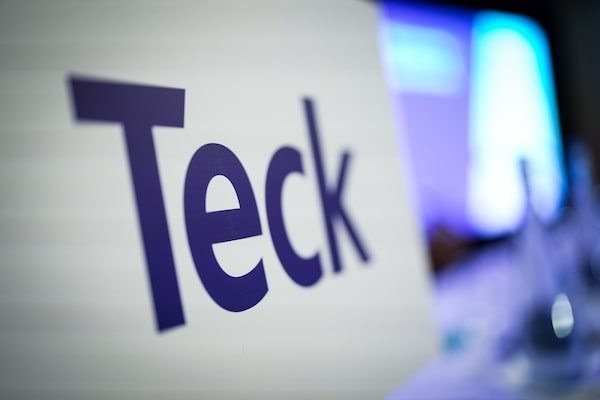
The Teck Resources logo on a podium before the company's special meeting of shareholders, in Vancouver, on April 26.DARRYL DYCK/The Canadian Press
Glencore PLC’s GLNCY proposal for Teck Resources Ltd.’s TECK-B-T coal business is worth US$8.2-billion, but it comes with contingencies that may reduce the ultimate figure, two sources with knowledge of the situation told The Globe and Mail.
The headline number is identical to what Switzerland-based Glencore was willing to pay for Teck’s coal business under an earlier plan that would have seen it buy all of the Canadian mining company.
The Globe is not identifying the sources, as they are not authorized to speak publicly.
Glencore and Teck declined to comment.
Earlier on Monday, Glencore and Teck confirmed they have entered discussions centred around a possible sale of Teck’s coal business, a major pivot from Glencore’s months-long efforts to buy all of Teck, which would include its copper and zinc mines.
The Vancouver-based miner had earlier rebuffed two Glencore buyout proposals for the entire business. Teck had consistently declined to even sit down with Glencore’s management to discuss a deal, so the development that the two have now engaged is a breakthrough.
Teck in a statement said the Glencore proposal is “preliminary in detail, conditional and non-binding.”
But even if Teck and Glencore can eventually land on a mutually agreeable buyout proposal for solely the coal business, there is no guarantee the deal will close.
Federal Industry Minister François-Philippe Champagne, who has veto power over the deal, on Monday made it clear that he has not softened his stance toward Glencore.
At an event in Saguenay, Que., celebrating an investment by Anglo-Australian mining company Rio Tinto Group PLC into Canada’s minerals sector, Mr. Champagne said that while he welcomed foreign investment, “in the specific case of Teck, we like them as a Canadian company.”
His comments mirrored an earlier statement he made alongside Natural Resources Minister Jonathan Wilkinson, and Deputy Prime Minister Chrystia Freeland in April, when all three wrote in a letter to the Greater Vancouver Board of Trade that “We need companies like Teck here in Canada – companies with a strong commitment to Canada.”
That letter came out not long after Glencore proposed to pay US$8.2-billion in cash for Teck’s coal business, and the balance in shares for its copper and zinc mines in a takeover worth US$22.5-billion in total.
However, unlike Teck’s metals mines, coal is not a critical mineral in Canada, so the national security risk around allowing Teck to be sold to a foreigner does not appear to be as acute.
But Mr. Champagne also has the authority to block any proposed acquisition of Teck’s coal business by Glencore if he finds the transaction would not be of net benefit to Canada.
Glencore in a statement on Monday said it is “fully committed” to ensuring that its proposed acquisition of Teck’s coal mines benefits Canada. The company added that it is prepared to work with Teck to identify commitments to maintain and potentially enhance Teck’s existing presence and capital investments, as well as community, social, labour and environmental programs.
Glencore is also already a major employer in Canada, with about 9,000 people working for its nickel mines and other operations in the country, which include a large grain handling operation called Viterra.
Any deal with Glencore would have to be approved by not just Teck’s management and the board, but by chairman emeritus Norman B. Keevil. Alongside Japan’s Sumitomo Metal Mining Co., he controls the company’s class A shares, which carry 100 votes apiece, compared to the single-voting class B shares.
Mr. Keevil declined comment for this story.
Deutsche Bank said in a note to clients that it would view the sale of Teck’s coal assets to Glencore as “an attractive middle ground for both companies.”
The bank added that the sale would provide Teck with a “cleaner exit from coal” than the company’s earlier botched restructuring plan.
The Canadian mining company had originally wanted to spin off its coal assets from its metals mines, but maintainfinancial ties between the two divisions for about a decade. In late April, after failing to win sufficient support from its shareholders, Teck decided not to move forward with that strategy.
After the spinoff proposal was killed off, Teck chief executive Jonathan Price said Teck’s new plan “is to pursue a simple and more direct separation.”
Teck indicated on Monday that no deal for the coal assets is imminent, noting that the board and an independent committee “are continuing to consider and evaluate all actionable, value-accretive proposals received relating to Teck’s steelmaking coal business.”
Glencore is one of the few big mining companies that would take on more coal. Most of its rivals are selling or spinning off their coal businesses to make themselves more appealing to investors who follow environmental principles. Coal in all forms is one of the biggest sources of planet-warming carbon dioxide emissions.
One of the few known rivals for Teck’s coal division is a consortium led by Pierre Lassonde, co-founder of mining royalty company Franco-Nevada Corp. Mr. Lassonde hopes to buy a significant minority stake in the division, but has not revealed the value of his proposal.
Mr. Lassonde declined to comment on Monday.
With a report from Nicolas Van Praet.